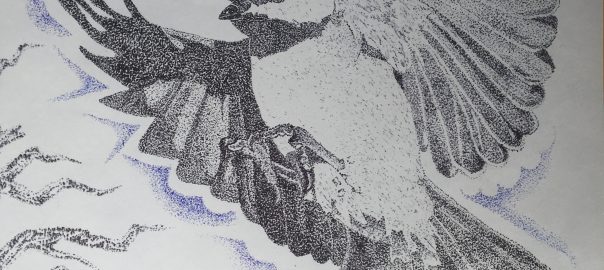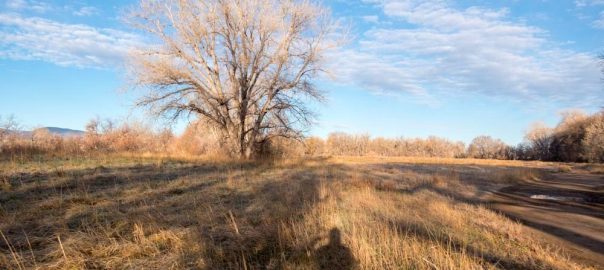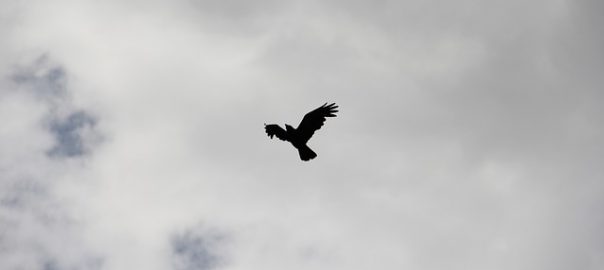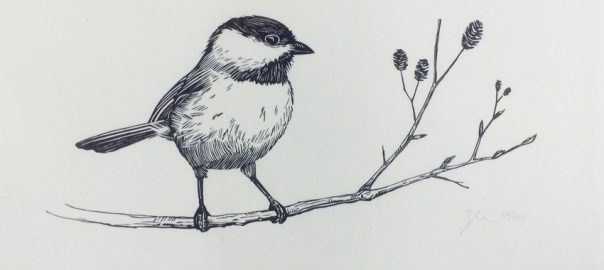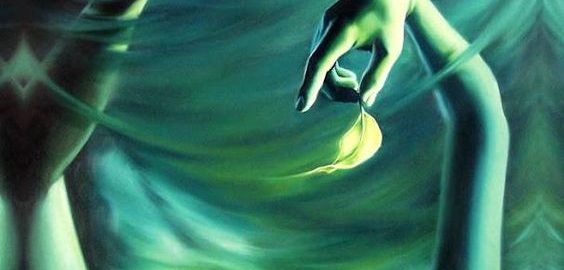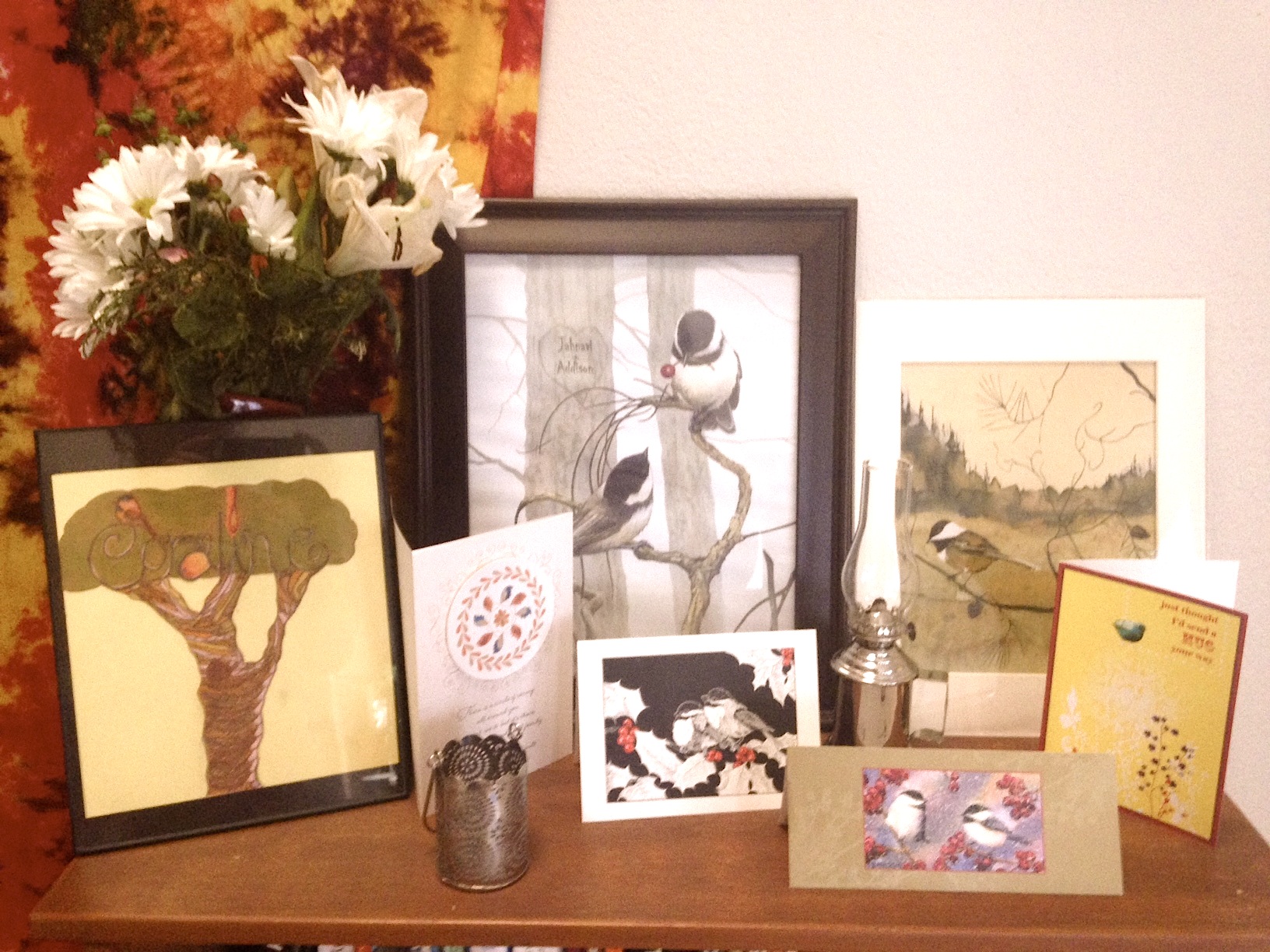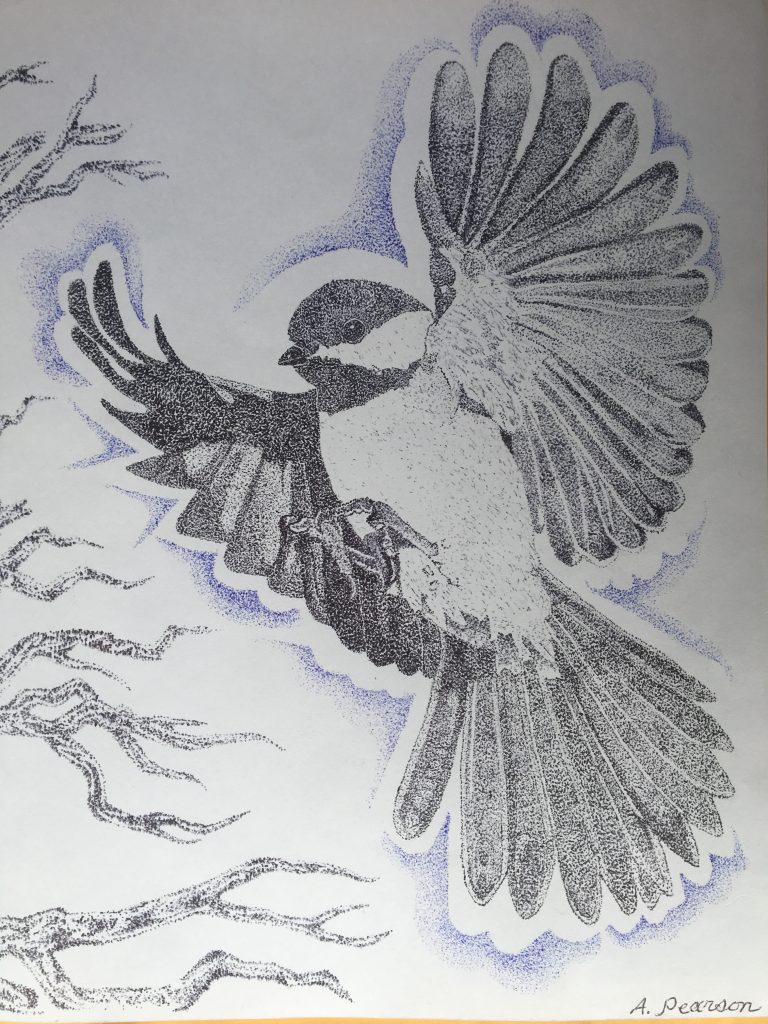
Each time we find ourselves standing on a stage or in a living room or in a backyard in Illinois or Vermont or Baltimore or Baton Rouge and we are holding our instruments and gazing into the unknown—a group of faces belonging to people we’ve never met, or people we’ve just met, or people we’ve known for years—we always reach that moment of free fall, when Addison introduces the song “Chickadee”.
“This next song is the title track of our new album, and is dedicated to our daughter, Chickadee,” he says, “who was stillborn two years ago. This whole tour is about her and this album we recorded for her. It’s also for you—all of you who showed up here and are making space for this music and this story.”
I stand transfixed, almost in horror, as he bares our bloody hearts for all to see.
“This song is the silver lining to something that was really hard,” he says. He begins playing and I fall into step with him. We free fall into the arms of strangers.
When the set is over and we enter into the midst of our audience, we find acceptance over and over again. We find a shared story with our listeners.
A woman approaches me. “Thank you for sharing that song about your daughter. Not many people talk about these kinds of things. My sister’s first and only child was stillborn. She doesn’t really talk to anyone about it and no one says anything to her, except for me. I’m going to share Chickadee with her.”
A man comes and stands with me, his eyes filled with tears. “Thank you for sharing your story. My wife and I lost three babies.” We embrace, and our tears mix together to create an elixir that heals us, a little more. Just a little more healing to get us through.
We’ve played our music for people all the way from Colorado to Louisiana and we finally arrive in Austin Texas where Chickadee was born, and where she is buried. The sights and smells remind me of the intense joy I felt while I was pregnant with her.
Our first show in Austin is at the Mohawk, a music venue with a stage and big lights that shine in our eyes as we stand up in front of a group of people we can’t see. I consider the option of bailing on the whole vulnerability aspect of the tour. This is a big venue, and people are here just to “have a good time”, right? We don’t need to ruin their nights by talking about our stillborn baby. But balking now would feel like a betrayal to something we’ve spent the past two years discovering.
Our voices and instruments are so amplified I feel as though I will be knocked over by the sound, so I try to ride the waves instead. We reach the part of our set where we’re supposed to play Chickadee’s song, and I barely breathe, not looking at Addison but watching his every move. Is he going to go through with it? He introduces the song. I wait, frozen. I wait for people to turn away in disgust. To walk out, shaking their heads. No one moves. I feel their hearts open, their willingness to go there with us.
“Being here with y’all is really what this whole tour is about,” Addison says. “Sharing this story and this album with people like you, especially here in Austin where this story began, is really special.”
After the music is over, we find our way off of the stage and once again into the arms of strangers. Human beings who have all suffered and lost, just as we have.
“Y’all are giving us all permission to be ourselves,” one person says after we’ve pulled everything off stage to make room for the next band.
“You’re doing something with your music that I want to be doing but don’t know how”, one musician tells us. He plays in different bands around Austin, but works on his own music as well. “I want to get there. I am figuring it out. I’m so inspired by your vulnerability and your story.”
A week and a half later, and about a month and half into our tour, we are going to a Buddhist gathering at the Travis Correctional Facility in Dell Valle Texas with our Dharma teacher, Alyssa. We pass a mandolin, banjo, guitar, harmonicas and fiddle through the security check and inside the fences and razor wire, and find a group of men in white and black striped jumpers, ready to meditate, to listen to our music and to discuss the wonders and hardships of being alive.
I look into the faces of these men, and see that their suffering has transformed them. They are in jail, but they are learning to find a freedom that they will always have access to—freedom from their thoughts, feelings and perceptions; freedom from judgement, freedom from attachment to things being a certain way; freedom from the notion of being a separate self but rather the freedom of finding ourselves in everything and everyone.
Addison, Alyssa, these prisoners and I have all come to this Buddhist practice through our own trials by fire, and we have arrived together from different paths, yet now we are together and trying to support one another along the same path. Alyssa greets each man as though he were a beloved son, embracing them and listening intently to their updates and check-ins.
We sit down and meditate together, following Alyssa’s instruction to relax the tops of our heads down to our feet, and to allow ourselves to arrive here fully. After meditating, I push metal finger picks onto my right hand and place the banjo into my lap. Addison tunes his five string violin and then we begin to play. The music transports all of us, beyond the prison walls, and we all forget where we’re sitting. We forget that this is the first time we’re meeting each other, feeling a familiarity that goes beyond our stories and judgements.
I tell the men briefly about losing Chickadee and how she appears in the song we just played and the one we’re about to play.
“I’m so sorry,” I hear one man utter softly.
After we play some more songs, a man shares the story of his father dying, while he was still in jail and unable to be with him. “Look at your hands,” Alyssa says. “Can you see your father’s hands in your hands? He is still with you, he’s still inside of you.”
“My father used to hold my hand through church service every Sunday,” he says. “I can still feel his hand on mine when I close my eyes.”
“Here in prison, right here with y’all,” one man says, pointing to the instruments in our hands, “is a joy I never experienced when I was ‘free’. Back when I was taking dope and peddling drugs, I never felt joy. I didn’t know what joy felt like. I would take drugs and ‘have fun’, but that was nothing close to this. Just sitting here in this circle with all of you, is the greatest joy I’ve ever felt.”
The men ask us questions about our life, how do we support ourselves, is it only with music?
“We offer people something that we have the ability to offer – our music, our story, our presence – and we always receive something back,” I say, “whether it’s money or a place to stay or a juvenile peacock feather tied to our merch case. Like being here with you and bringing you joy is a compensation that goes beyond anything we can compare. It’s the most fulfilling thing I can think of doing.”
It’s time to leave, so Alyssa rings the bell, and we bow to one another in gratitude for showing up and for what each person shared of themselves. Then we turn to bow to the trees and the insects and the sky and to all of our ancestral teachers. As the men prepare to leave, they give each of us hugs, thanking us for coming.
We make our way back out of the giant cage of the jail, and Alyssa asks if telling Chickadee’s story over these two months on tour has been like ripping a scab off of a wound repeatedly. Alyssa lost her grandson a few days after he was born, not long before we lost Chickadee, but I still haven’t heard her talk directly about him in her Dharma talks. Maybe one day she will.
“You know I don’t think there was a scab on the wound to pull off,” I tell her. “Talking about Chickadee and playing her songs for people has been helping the wound to scab and heal, instead of just bleeding non-stop.”
I used to feel so isolated in my grief, bemoaning the lack of ceremony we have as a culture around death, especially of babies and children. I had no idea until I was a bereaved mother that the way the death of babies is handled by many people is by avoiding the subject, for fear they might “upset” me, as if I’m not already beyond upset. But I don’t feel angry about the avoidance anymore. I understand their silence comes from not knowing what to do or say. So Addison and I created our own ceremony around Chickadee’s death by recording her an album and traveling the country with it.
The next morning after visiting the prisoners, we packed some snacks and Zoso into the car, picked up birdseed from the store and drove the thirty miles east out of Austin to Eloise Woods, the green burial site where we left Chickadee’s tiny little body two and half years ago.
On the day she was born, we had held her for hours, admiring every inch of this little miracle who emerged from my body. A few visitors had come and gone, crying over her both in sadness and in wonder, including my sister and my dad, who’d flown in at short noice when they heard the news. The hospital put her on ice afterwards, to give me time to recover from giving birth and slowly regain feeling in my lower body from the epidural.
Later we asked to see her again, and we cradled her cold, bundled body, looking into her face and wondering what we should do with her. The hospital was offering to incinerate her and give us a tiny urn filled with her ashes. Our midwife was telling us about a green burial space that we could bring her to.
“But we’ll need to keep her on dry ice all night, and change the ice out every four hours,” she said. “And we need to bury her tomorrow for sure. Her body is very fragile and delicate, and it will start to fall apart quickly.”
Talk about fucking impermanence.
I was trying to wrap my mind around keeping her in a box in our bedroom and changing out dry ice in the middle of the night when I could barely even walk and Addison was a bereft zombie version of his former self, when my sister stepped in.
“I can take care of that,” she said. “I’ll set a timer and change her ice out and whatever else needs to be done. You won’t have to think about it.”
She looked into my face, and I know that she could tell that the difference between us burying Chickadee or cremating her was what kind of support she could give us in this time of utter disbelief.
“Ok,” I said, knowing that I could rely on her. As soon as my sister received the news that my baby died while I was in labor, she’d gotten on the first plane out of Seattle that she could find a ticket for. “Thanks Radha.”
I’d imagined Eloise Woods to be an open area, a rolling cemetery covered in bright green grass with giant willows weeping across the symmetrical lines of gravestones. But Texas is not the northeast, where I’ve spent most of my life. This green burial place is a couple of acres covered by scraggly oaks and scrubby brush, with stony paths cut through the woods. Erect gravestones are not allowed, so all of the markers lie flat on top of the burial mound they belong to, mostly marking the graves of babies and pets, though some adults rest there as well.
We arrived in a caravan of cars. Addison parked our car in the shade where I waited with our daughter in a styrofoam ice chest beside me. My sister visited with me in between checking on the progress of finding a spot to bury Chickadee. Addison wanted the best place for her and was walking in circles around the site, trailed by his mother, my dad and the midwife. What felt like an eternity later, he’d decided on a couple of options, and they led me around and showed me our choices. I was dismayed by how hot and merciless the sun was, and by how unwelcoming this place felt, and despaired at finding a burial place I could be happy with. At one spot I was being shown, I turned around and looked behind me. There was a corner patch of woods where I could see an opening at the foot of an oak tree.
“What about over here?” I asked. Everyone turned and looked. I wanted Chickadee to be buried somewhere remotely shady, and between the oaks and a big pine nearby, it was one of the shadier options. It was also a private nook, where no one else was yet buried.
Everyone agreed it was a good spot.
I went back to my seat in the car with Chickadee, and the men got to work, relieved to have something to do with themselves. They cut back brush, raked and eventually were able to begin digging her burial spot. It need to be at least three feet deep, which is no small task with soil as hard and rocky as this Texas soil was.
A chaplain, who my midwife had asked to come, was helping to cut and dig, when I asked if I could see him and talk to him about the ceremony he was planning on leading for my daughter. He walked slowly to the car, brushing dirt from his hands, and sat next to me solemnly.
“Mary Ellen asked me to do something involving some Christian songs and words,” he said, “but I hear you’re not Christian.”
“No, I’m not,” I said. “Not that I have an aversion to Christianity either.” I think my dad had been worried about his granddaughter getting Jesus-afied during her burial, because he’d seemed a bit grumpy after the chaplain’s arrival.
“What do you believe?” the chaplain asked me.
I was so glad to be having this conversation. So glad that someone was asking me this.
“Everything I’ve read that the Buddha taught really makes sense to me,” I said.
“So are you Buddhist?”
“I don’t know…” I said slowly. “Maybe I am.”
We talked about life after death, spirituality, God or no God, all of the topics I love discussing with intelligent yet kind people such as this man.
We wrote out the ceremony together, and when it was time all of us formed a semi-circle, standing or sitting, around the freshly dug hole. Addison went to the car and carried the little bundle of his daughter over to the grave and carefully lowered her in. Later I would regret not having held her one last time, but at that moment I just sat and watched her go into the ground.
Addison and I each sang her a song, and her Nana tried to sing her a song but couldn’t get the words out through her tears, so Radha and I picked up the song where she’d left off and sang it. Radha also read her a message from my friend Colleen, and my friend Alice read her a Mary Oliver poem. MariMikal and her friend sang a couple of songs as well, and then my dad stood up to say some words.
“I can’t help feeling that she’ll be back,” he told all of us. “She came to Jahnavi and Addison at an important time in their lives, and now that her work is done she left again. But I think she’s coming back.”
When it was time to bury her, I lowered a beautiful moonstone necklace onto her bundle, given to us by the midwife’s assistant, along with a moonstone necklace each for Addison and I. Everyone surrounded her and began to pour shovels or handfuls of dirt over her. A chubby stone chickadee was placed at the head of the grave, along with some other pieces of art and beauty brought by friends or family.
Two and half years later we are arriving in the same car we’d transported Chickadee in, but this time we know our way around. We open the gate and roll in on the bumpy dirt trail, parking at the beginning of the Moonlit Garden path. Zoso knows the drill, and bursts from the car in a flurry of excitement, and commences with peeing on things and chasing rodents through the underbrush.
It’s spring this time, and although it’s sunny, it’s not yet too hot. There are wildflowers bursting with vivid colors all around, and it lends a feeling of cheerfulness to this unassuming patch of Texas forest. I look around, wondering how much of Chickadee’s essence is dispersed through the landscape here, how much of her is still inside of me, and where is the rest of her?
According to Thich Nhat Hanh and the Buddha and science, our bodies and energy re-disperse into the world around us after we die, our molecules becoming a part of the insects, trees, plants, birds, sunshine, rain and clouds. Perhaps our mind-stream carries on to another form, but that is always up for debate. As the Dalai Lama says, until science can prove that re-birth does or does not exist, then maybe it does.
“As far as I know, no modern psychologist, physicist, or neuroscientist has been able to observe or predict the production of mind either from matter or without cause,” he says. If something has no beginning, it makes sense that it has no end.
Addison and I sit by Chickadee’s grave for a while, talking, playing music, journaling, reading and, of course, filling up her bird feeder with a mix of sunflower seeds, peanuts and safflower seeds. I sprinkle the seed mix around her spot, and Zoso wanders around picking up the peanuts and munching them contentedly. He’s hot, and keeps trying to do the frog dog, legs splayed out and belly to the cool earth, directly on top of Chickadee. Addison keeps shooing him off, but I finally say, “You know what, just let him. She’s his little sister and I don’t think she minds.”
Yes, I know that a dog can’t actually be related to a human, but Zoso is our baby and so is Chickadee, so there it is.
It’s strange sitting with a part of me that has been buried.
We take a walk around the grounds, noticing new burial sites with markers from 2018 or 2019. Beautiful quotes engraved in stone mark the paths, and we pause to read them or to smell the fragrant wildflowers who smile up at us. We find a dog bowl for Zoso because he’s hot and thirsty, and as we search for a spigot to get him some water, we discover a two foot tall medicine Buddha hiding behind the tool-shed.
“Oh wow,” I say.
“What’s he doing behind here?” Addison asks.
“He’s too tall to meet the marker requirements,” I observe. “And they don’t want statues set up here either. I know we have our chubby chickadee, but we are technically breaking the rules. So someone probably brought him here not knowing that, but then the caretaker saw and hid him back here while they figured out what to do with him.”
“Let’s take him to Chickadee’s spot,” Addison says.
“Ok,” I laugh. “They’re going to discover him sooner or later and carry him away again, but we might as well bring him over to hang out with her for a while anyway.”
Addison picks up the Medicine Buddha and sets him next to Chickadee’s grave. The Buddha gazes down at her in his cross-legged pose of blissful concentration.
Chickadee left a legacy of the greatest sorrow we will ever know. And she has left a legacy of music that we hadn’t known how to play until she came around. She taught us to be brave. She helped us commit to a spiritual practice, first when we were expecting her and meditating with her every morning, and after she left us. She has shown us that we really are interconnected with all beings, and that everyone has a story. If we stay vulnerable and just listen, we will hear the entire universe in the laugh of a baby, we will see all of the oceans in the tear of a woman, and we will smell the beauty of the entire world in the fragrance of a flower. When we begin to live our lives for the benefit of others, our happiness expands and we can begin to truly see other people as human beings with a story and a legacy of their own, which is not separate from ours.
We’re all in this together.
